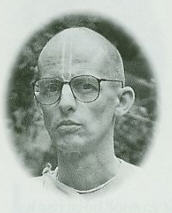
Satsvarupa Dasa Goswami
WE CONSTANTLY HEAR from scripture and from others about the ideal lives of great devotees in our line. We especially relish hearing about Srila Prabhupada's life, and we take inspiration from his deep devotion for guru and Krsna to spark our own. It is natural for people to want to hear about others' adventures in order to gain something for themselves some inspiration, some strength, some knowledge, or even just some confidence. Although we usually can't directly apply the life experience of another in our own lives, and we can rarely imitate someone else's success, still, we can learn by example to follow our own spiritual aspirations.
Recently I was hearing Srila Prabhupada on tape describe the incidents leading up to his taking sannyasa, the renounced order of life. Several times in his life his spiritual master had appeared to him in dreams, beckoning him to come and take sannyasa. The first time he'd had the dream, Srila Prabhupada relates that he thought, "How horrible!" He said he had considered the austerities of mendicant life too arduous. Srila Prabhupada sometimes said that he didn't like to perform physical austerities, although the austerities he performed as founder-acarya of ISKCON were incredible. At the time of this dream, however, giving up his family seemed too difficult. Still, he took the dream seriously as something to move toward.
Years later he had the dream again, right after a business venture an attempt to open a factory in Lucknow had failed. Again, "Take sannyasa." Again he thought he couldn't do it immediately. Then he remembered a verse in the Bhagavatam where Krsna says that if a devotee is sincere but materially attached, His first mercy on such a soul is to crush his material life and leave him nothing but Himself for shelter.
These are Srila Prabhupada's experiences, and we can learn from them. We too may find ourselves praying to render more service. We too may feel the spiritual master pushing us to do more than we are doing at present, to do something that would require greater sacrifice and that would both increase our spiritual advancement and place demands upon it. Srila Prabhupada's example proves that even if we cannot at once respond to such a challenge, we should never dismiss the inspiration. Rather, we should be patient and humble and remain alert for opportunities to fulfill our dreams for more service. We should also try more and more to understand the essence of Krsna consciousness and purify our motivation.
When Srila Prabhupada thought about taking sannyasa, he understood that the essence of renunciation was simply service to Krsna. When Lord Caitanya had wandered about in ecstasy in Radha-desa after having Himself accepted the renounced order, he quoted this verse from the Srimad-Bhagavatam (11.23.57): "I shall cross over the insurmountable ocean of nescience by being firmly fixed in the service of the lotus feet of Krsna. This was approved by the previous acaryas, who were fixed in firm devotion the Lord, Paramatma, the Supreme Personality of Godhead." Srila Prabhupada writes in his purport that Lord Caitanya accepted sannyasa to express the essence of renunciation, which is only to serve Krsna.
As early as 1922, Srila Prabhupada had received his spiritual master's order on how he should serve; he was to preach Krsna consciousness to the English-speaking world. Therefore, his acceptance of sannyasa was only for that.
Our aspirations for increased service may not be received in a vision while we are asleep. Rather, they may be awakened by our constant hearing of the lives of great souls. It is imperative to listen to the voice of aspiration if we are going to avoid mediocrity.
Srila Prabhupada always credited his spiritual master for pulling him out of material life. "I have not lost anything," he said. "I had three children, now I have three hundred children."
We do not lose by depending on Krsna's mercy and not on so-called material security. Srila Prabhupada approved of our thinking big in Krsna consciousness, not because he was utopian but because, "Krsna can do anything."
Satsvarupa Dasa Goswami travels extensively to speak and write about Krsna consciousness. He is the author of many books, including a six-volume biography of Srila Prabhupada.
